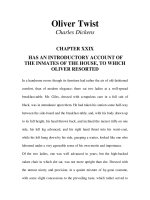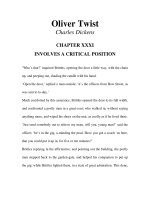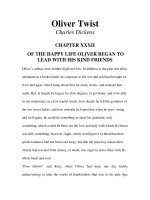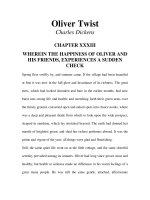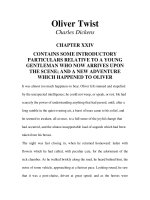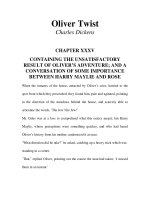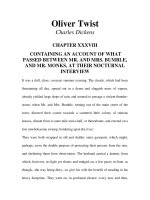Tài liệu LUYỆN ĐỌC TIẾNG ANH QUA TÁC PHẨM VĂN HỌC-THE ADVENTURES OF HUCKLEBERRY FINN CHAPTER 5 pptx
Bạn đang xem bản rút gọn của tài liệu. Xem và tải ngay bản đầy đủ của tài liệu tại đây (17.96 KB, 8 trang )
THE ADVENTURES OF HUCKLEBERRY FINN
CHAPTER 5
I HAD shut the door to. Then I turned around. and there he was. I used to be
scared of him all the time, he tanned me so much. I reckoned I was scared
now, too; but in a minute I see I was mistaken -- that is, after the first jolt, as
you may say, when my breath sort of hitched, he being so unexpected; but
right away after I see I warn't scared of him worth bothring about.
He was most fifty, and he looked it. His hair was long and tangled and
greasy, and hung down, and you could see his eyes shining through like he
was behind vines. It was all black, no gray; so was his long, mixed-up
whiskers. There warn't no color in his face, where his face showed; it was
white; not like another man's white, but a white to make a body sick, a white
to make a body's flesh crawl -- a tree-toad white, a fish-belly white. As for
his clothes -- just rags, that was all. He had one ankle resting on t'other knee;
the boot on that foot was busted, and two of his toes stuck through, and he
worked them now and then. His hat was laying on the floor -- an old black
slouch with the top caved in, like a lid.
I stood a-looking at him; he set there a-looking at me, with his chair tilted
back a little. I set the candle down. I noticed the window was up; so he had
clumb in by the shed. He kept a-looking me all over. By and by he says:
"Starchy clothes -- very. You think you're a good deal of a big-bug, DON'T
you?"
"Maybe I am, maybe I ain't," I says.
"Don't you give me none o' your lip," says he. "You've put on considerable
many frills since I been away. I'll take you down a peg before I get done
with you. You're educated, too, they say -- can read and write. You think
you're better'n your father, now, don't you, because he can't? I'LL take it out
of you. Who told you you might meddle with such hifalut'n foolishness,
hey? -- who told you you could?"
"The widow. She told me."
"The widow, hey? -- and who told the widow she could put in her shovel
about a thing that ain't none of her business?"
"Nobody never told her."
"Well, I'll learn her how to meddle. And looky here -- you drop that school,
you hear? I'll learn people to bring up a boy to put on airs over his own
father and let on to be better'n what HE is. You lemme catch you fooling
around that school again, you hear? Your mother couldn't read, and she
couldn't write, nuther, before she died. None of the family couldn't before
THEY died. I can't; and here you're a-swelling yourself up like this. I ain't
the man to stand it -- you hear? Say, lemme hear you read."
I took up a book and begun something about General Washington and the
wars. When I'd read about a half a minute, he fetched the book a whack with
his hand and knocked it across the house. He says:
"It's so. You can do it. I had my doubts when you told me. Now looky here;
you stop that putting on frills. I won't have it. I'll lay for you, my smarty; and
if I catch you about that school I'll tan you good. First you know you'll get
religion, too. I never see such a son.
He took up a little blue and yaller picture of some cows and a boy, and says:
"What's this?"
"It's something they give me for learning my lessons good."
He tore it up, and says:
"I'll give you something better -- I'll give you a cowhide.
He set there a-mumbling and a-growling a minute, and then he says:
"AIN'T you a sweet-scented dandy, though? A bed; and bedclothes; and a
look'n'-glass; and a piece of carpet on the floor -- and your own father got to
sleep with the hogs in the tanyard. I never see such a son. I bet I'll take some
o' these frills out o' you before I'm done with you. Why, there ain't no end to
your airs -- they say you're rich. Hey? -- how's that?"
"They lie -- that's how."
"Looky here -- mind how you talk to me; I'm astanding about all I can stand
now -- so don't gimme no sass. I've been in town two days, and I hain't heard
nothing but about you bein' rich. I heard about it away down the river, too.
That's why I come. You git me that money to-morrow -- I want it."
"I hain't got no money."
"It's a lie. Judge Thatcher's got it. You git it. I want it."
"I hain't got no money, I tell you. You ask Judge Thatcher; he'll tell you the
same."
"All right. I'll ask him; and I'll make him pungle, too, or I'll know the reason
why. Say, how much you got in your pocket? I want it."
"I hain't got only a dollar, and I want that to --"
"It don't make no difference what you want it for -- you just shell it out."
He took it and bit it to see if it was good, and then he said he was going
down town to get some whisky; said he hadn't had a drink all day. When he
had got out on the shed he put his head in again, and cussed me for putting
on frills and trying to be better than him; and when I reckoned he was gone
he come back and put his head in again, and told me to mind about that
school, because he was going to lay for me and lick me if I didn't drop that.
Next day he was drunk, and he went to Judge Thatcher's and bullyragged
him, and tried to make him give up the money; but he couldn't, and then he
swore he'd make the law force him.
The judge and the widow went to law to get the court to take me away from
him and let one of them be my guardian; but it was a new judge that had just
come, and he didn't know the old man; so he said courts mustn't interfere
and separate families if they could help it; said he'd druther not take a child

